IN FOCUS: Life after football in Singapore – from running food stalls to planning weddings
Most Singapore footballers hang up their boots when they are in their 30s and have to make career pivots. Current and former players tell CNA how they have prepared for life after football.
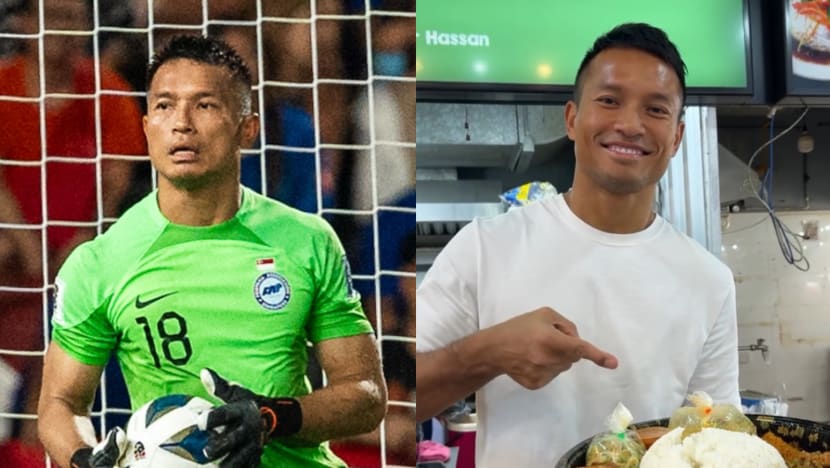
Singapore goalkeeper Hassan Sunny between the goalposts and at his food stall in Tampines. (Photos: Facebook/FAS, Instagram/dapurhassansg)

This audio is generated by an AI tool.
SINGAPORE: About five years ago, Singapore goalkeeper Hassan Sunny started thinking about life after football.
Then 36 and fresh from his second stint in Thailand with Army United, he had a dream of starting his own food stall, having grown up around his uncle and aunt’s nasi padang (rice and dishes) stall.
“I learnt a lot from them, how to run it, what to do and so if I were to have a mid-career change, it wouldn’t have been much of a difficulty to adapt,” he told CNA. “I enjoy cooking at home. So in a way, everything aligned and everything connected.”
He opened his first stall in 2020. Today, he owns Dapur Hassan in Tampines, which sells Malay dishes.
His stall hit the headlines recently when throngs of Chinese fans flocked there – Hassan’s heroics for Singapore in a World Cup qualifier helped keep alive China’s hopes in the competition.
The reports brought into focus the life of Singapore’s footballers after their time on the pitch. Many pivot to other jobs - property agents, car salesmen, food stall owners - while others stay in the game.
BEFORE THE LIGHTS GO OFF
Footballers have relatively short careers. Most retire in their 30s if they steer clear of serious injuries.
Unlike the top European leagues – where players are given huge paychecks – almost no Singapore footballer can leave the game and never need to work again.
It is vital for footballers to start preparing for life after they hang up their boots, current and former players told CNA.
While this sentiment might seem obvious now, this was not always the case.
Former Singapore international R Sasikumar said that back in his playing days, footballers did not always think about life after their careers.
“Information wasn’t as free-flowing back then … It was tough for us to wrap our heads around what opportunities there were,” recalled Sasikumar, who retired at 29 in 2004.
“The immediate thing a lot of people defaulted to was to go into coaching … I tried but I realised very quickly that it didn’t pay the bills in Singapore, plus I didn’t want to be there.”
Players today are more savvy and open-minded and they understand the “uncertainty of football”, he said.
“When the lights go off, you’re on your own. Build something when the lights are still on you. And a lot of them are (today).”
Sasikumar started planning when he was 24 and in his prime, launching an events management company with friends.
He knew at some point that “all of this will end” and he did not want to be left with no options and scrambling for another job.
“I knew that if I wanted to be comfortable, if I wanted to be happy in my life, I had to do certain things which I was happy doing,” he recalled.
He moved to Australia to work in a sports marketing agency after his time on the pitch.
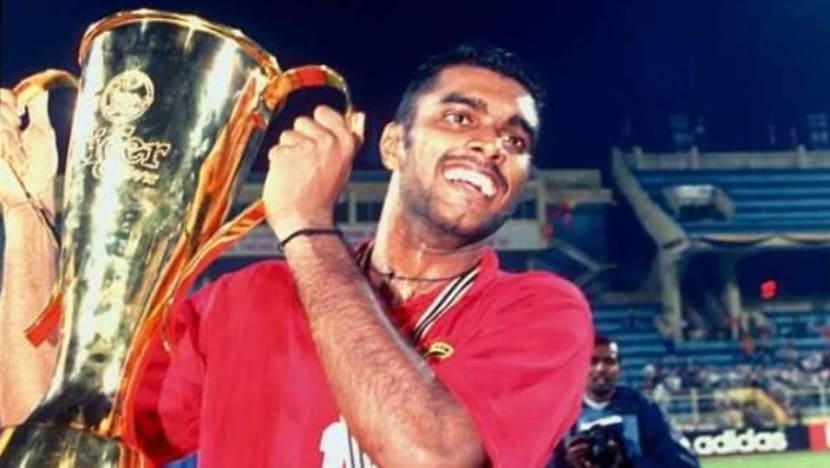
One current player who is making plans is Singapore national team captain Hariss Harun, who got into the real estate industry late last year.
The 33-year-old said: “I am reaching the point of my career where I need to think about the next phase somehow or another.”
Hariss and his wife are registered property agents with Propnex. While the Lion City Sailors captain continues his football career, his wife runs Hariss Harun Real Estate.
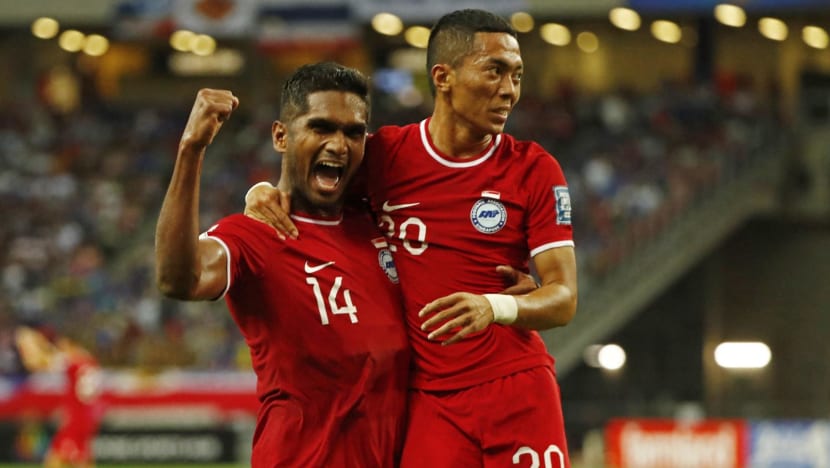
He is not alone in exploring a future career in property – Balestier Khalsa defender Emmeric Ong went down that path about five years ago.
Being a property agent allows him to be flexible and plan around his football schedule, Ong said. “It is about self-motivation, for you to push yourself,” he added.
While there are ups and downs, it is also a job which has allowed him to consistently bring in a five-figure income in some months, said Ong, who is a property agent with Hutton’s Navis agency.
Away from property, another footballer who started thinking two steps ahead while he was still playing was former Hougang United midfielder Muhaimin Suhaimi.
Growing up in a low-income family, he experienced “rock bottom, to the point where I didn’t have money to eat”.
Football was a way out for the midfielder, who was part of the 2017 Singapore SEA Games squad.
But he knew it was not the end goal, recognising that he was not in the top tier of footballers who could make “good money” playing the sport.
“I had to be true to myself. I knew that I was not in the top 5 per cent or the top 1 per cent,” he added.
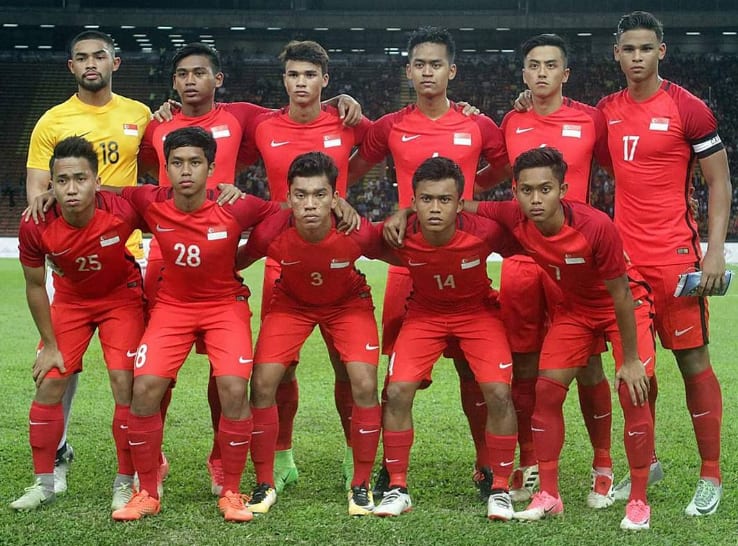
“I really needed to change my life. Football was not going to change it, but I needed to leverage football to achieve what I wanted.”
The 29-year-old pumped his salary into various courses and started new ventures. The first was a car wash.
“I knew the only way to change my life was business,” he added.
Along the way, there were a number of failures but he never gave up. Today, Muhaimin owns multiple businesses, including Luna, a wedding planning company.
“You have to work towards it – take some courses, try to talk to people outside on what to do, how they do (it),” added Muhaimin, who retired when he was 26.
“You have to prepare yourself for life after football … Some footballers when their contract is not renewed then they start thinking about what to do (next). It’s too late.”
“A VERY LONELY PLACE”
Moving on from the sport can be difficult. Some have a career spanning more than 20 years, eventually retiring when they are in their late 30s.
But for others, their time on the pitch may be cut short – an injury, not being able to find another club, or just running out of motivation.
In 2003, Sasikumar’s contract was cancelled by Tampines Rovers. He was eventually offered a short-term contract with Home United a year later, and he decided to retire thereafter.
While this meant that he ended his career on his own terms, for about six months, the towering defender was depressed.
“It’s a horrible feeling, but I suppose you have to ride through it. I was really sad. I couldn’t watch a game, I couldn’t watch my teammates play. It was tough,” Sasikumar recalled.
A footballer’s life revolves around routine – training, eating and matches on the weekends.
Another big part of it is the camaraderie of a team. Teammates form a support network that many miss when they retire.
“It was being around people. The team dynamics, the dressing room … playing for the national team, big games,” said Sasikumar.
“When you wake up one day and say this is all over, it’s quite scary.
“It was a combination of things. The friends you made in football, the winning, the ups and downs of life which were really fast and furious … Now you’re on your own, there’s no team, it’s just you.
“It can be a very lonely place.”
Losing this support network is something not many professionals talk about.
“That’s when you become really insecure about yourself, because it’s like who are you really? What’s your identity?” said Sasikumar.
There are players who try to prolong their careers for as long as possible because they don’t know what to do outside football, and are comfortable doing what they have been doing, he added.
“It’s procrastination because if you don’t want to face reality, what do you do? You keep doing the same thing,” he said. “A lot of players do reach out to me (to ask what they can do next).”
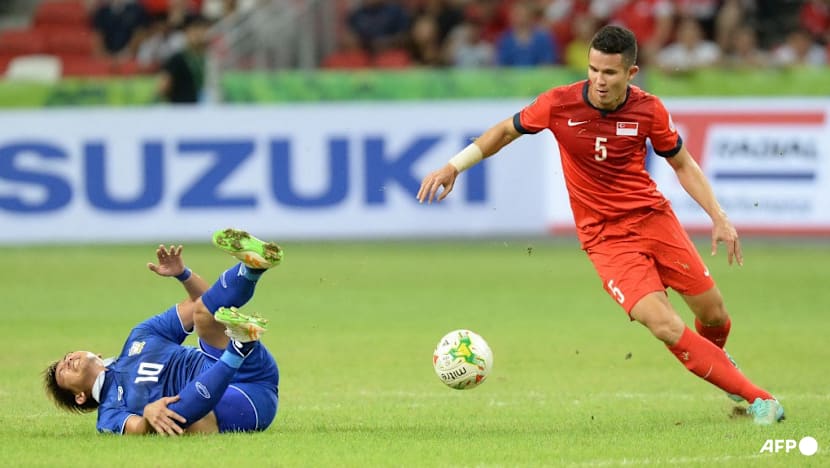
One recently retired footballer recalled his emotions when he called time. With a career spanning almost 19 years, former defender Baihakki Khaizan is one of the most recognisable names in the sport in Singapore.
He recalled how for the first month after he retired, he would still prepare his boots and gear as if to go for training.
“My wife would ask me: ‘Do you know that you don’t have any more training?’” said Baihakki, who retired at 36 in 2022.
“It kind of brings your self-confidence down. It plays in your mind - I’m not good anymore, I’m old, I’m not needed.”
What helped with moving forward was that Baihakki felt he had achieved all that he had set out to do.
When he retired, he was Singapore’s second-most capped player, with 140 appearances in the Lions jersey.
“The career that I had gave me the satisfaction to say: ‘Bai, I think you’ve checked all the boxes,’” he explained.
Today, Baihakki spearheads a Football Association of Singapore (FAS) initiative to better support footballers and prepare them for life after their careers.
Called the FAS Players’ Concierge, it is a support network for the careers of current players and provides retired players with the necessary tools.
For one, the initiative aims to connect ex-players with various sectors to open job opportunities and provide networking. The goal is to support them in finding meaningful employment beyond their playing careers.
To his knowledge, a large majority of players who retire go into football-related roles, said Baihakki, who is now FAS’ Head of Planning.
Given this interest in staying in the sport, the Concierge worked to set up the AFC C Diploma course for professional players earlier this year.
The coaching course, held in February, was open to current and former national team players, as well as Singapore Premier League and Deloitte Women’s Premier League players.
Baihakki speaks with players every two weeks to find out what their interests are and how to best help them.
Defender Emmeric Ong, 33, said: “It’s good that Bai started something. Now the courses or the jobs are still a bit limited, but it’s just a start.
“Hopefully it can be broader so people can at least have more options.”

FOOTBALL A “MASTERCLASS” IN BUSINESS
But what does kicking a ball have to do with running a business or selling homes? Footballers who CNA spoke to said that there are skills which are transferable.
“I’m quite grateful to have football. Football taught me a lot of lessons,” said Hassan. “Determination, that never-give-up attitude that when things go south – you keep on pushing.”
Footballers bring qualities such as confidence, good communication skills and the ability to deal with high-pressure situations and work in a team, said Baihakki.
“Everything I brought into business is thanks to football,” added Sasikumar, who started his own agency in 2005.
Footballers come under scrutiny to perform every week. Learning how to deal with that pressure has taught him lessons that he brought into running his own business.
“When I started managing a team, I thought about all the good coaches who managed egos in the dressing room … how to get performances (out of them). Football taught me a lot,” he added.
“Football is a masterclass in business … I didn’t go to Harvard to do my executive MBA (Master of Business Administration) and stuff like that, but I spent 12 years as a pro and that was enough to teach me how to run a business.”
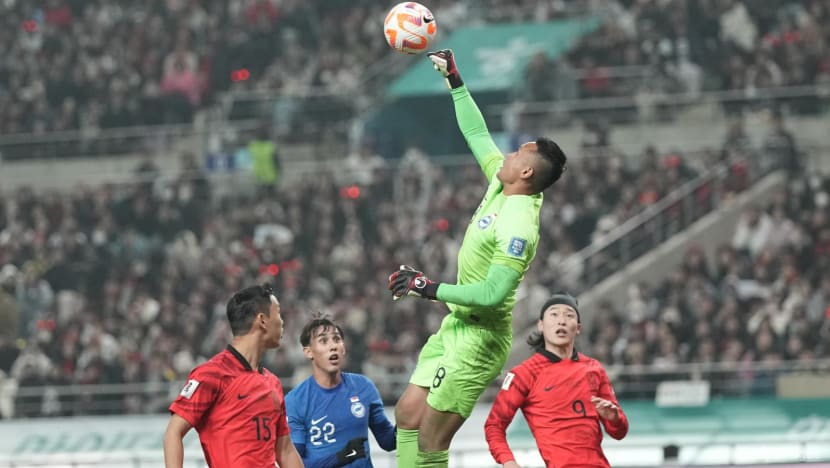
However, this transition is not easy - there are hurdles juggling football and new endeavours.
Hassan recalled how in the early days he would have to stay in his shop until the wee hours of the morning.
“I had to clean the shop, I had to do the financial part - planning, admin, logistics. I had to do it alone,” recalled Hassan.
“There was once I had to speak to the management in the coffee shop to let me stay until probably 1am to clean up the place.”
Daily operations are now run by his wife, Aidah Rahim, and her two aunts.
At 40, Hassan’s professionalism has seen him stay at the top level locally. He believes it is possible to prepare for life off the pitch while footballers are still playing.
“There’s a lot of work done behind the scenes, it’s whether you want it or not,” he said. “It’s how you plan and manage (your time).”
For Muhaimin, it was rushing down after each training session to run his cafe. He was 18.
“I would classify myself as the most boring teammate ever. Literally after training, you will never see my face,” he said.
“It was not that I didn’t want to hang out with my friends, I did sometimes. But I felt that I needed to focus on myself … I cannot really waste any second, I could not waste any minute.”
It was both exhausting and scary.
“I didn’t have any knowledge in business and I didn't have any mentors,” said Muhaimin.
“(But) I had nothing to lose. From there I just launched my business and saw what the response was and from there I would just learn.
“I told myself that even if I didn’t have the right preparation for my products and services, I feel that’s the only way for me to learn.”
One of the biggest challenges some footballers face is the lack of guidance when moving on to this new stage of life.
While others may chip in with advice, it boils down to the footballer making their own decisions.
“As much as I received advice … I learnt a lot from my relatives, but at the end of the day you have to do it on your own,” said Hassan.
“I had to do my own planning, I had to know the workflow … that was the initial challenge I faced.”
It is normal to face difficulties when starting something from scratch, said Hassan, but things settled after four to five months.
Without much help when he started off, Sasikumar didn’t know who to turn to.
“Maybe the sporting ego side of me said that I’m going to figure this out myself, in hindsight that was the stupidest thing to do,” he added.
“I think players now are more open to mentors … they know they don’t know everything, they need to look for help and it’s okay to ask.”
JUGGLING FOOTBALL AND CREATING A NEW LIFE
Playing a professional sport is not easy, especially with criticism on social media.
If the team plays badly, people look for avenues of blame - and it sometimes falls on footballers’ activities off the pitch.
Sometimes, these activities include footballers creating a new career while they’re still playing.
Hariss has grown up in the spotlight. Singapore’s youngest debutant when he was just 16 years old in 2007, the midfielder is preparing for life after football.
“In terms of the balancing act, people don’t know that my wife and I try to manage things in a way that it doesn’t affect my football,” said Hariss.
“It’s very easy when I have a bad game or make a mistake to say: ‘Oh it’s because he’s doing property and didn’t get enough rest’.
“It’s normal, it’s something which I have to accept comes with my line of work as a player as well as now that I’ve started something with my wife in the property industry.
“But it’s not nice to hear certain things. I’ve to learn to deal with it and to do the best I can in both fields.”
He added: "We need to be realistic. In Singapore you must always be prepared (for the future)," said Hariss.
During the COVID-19 pandemic, the national team captain started to think about life after football and took up a scholarship.
He now has a bachelor’s degree in business and marketing from Coventry University at PSB Academy.
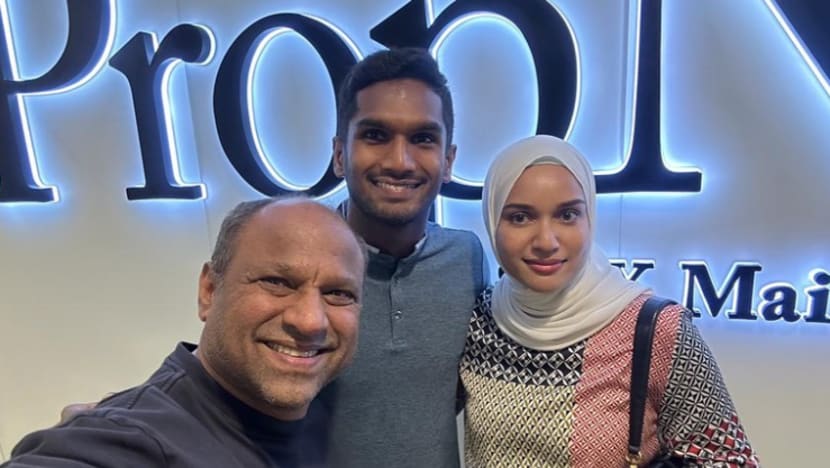
There are pressures associated with being a recognised figure in a new industry, as national team captain Hariss can attest.
“It does (help with business). But there is also pressure that people know me for the athlete that I am so when they engage us … there is that pressure to do the job as best possible,” he explained.
“They engage you not to take photos or autographs. They expect service.
“My wife and I try to be as professional as we can, we have to do our job. We remind ourselves that no matter what, whether it is a fan or not, or just the general public who doesn’t know me, we still have to do our best.”
He told CNA that while he is happy to have the “option” of being a property agent, he wants to give back to football in the future.
At the end of the day, those who started preparing early said they had no regrets.
For Muhaimin, leaving football was something he looked forward to. “(By then) I didn’t really rely on football for my livelihood and I could stop anytime,” he explained.
While he found joy in the sport, a different kind of joy came with starting his own business and earning money from it.
“In terms of whether I miss football? Not really. I’m having the time of my life,” he added. “I don’t know when was the last time I played football.”
Preparing for the future has also given Ong a sense of stability.
“I feel like I’m quite stable already. But there’s always that feeling that I don’t want to stop playing football – I think every footballer feels that way,” said Ong, who has been in the game for more than a decade and also does coaching.
It is important to plan for the future, said Hassan.
“If you have kids, maybe you have two or three kids, it’s always not enough,” he explained. “That’s why I think it’s better to have something to fall on after football.”
When he eventually decides to close the chapter on a storied football career, there will be things that he will miss.
“It’s been a long journey for me. For me to just put a full stop to all this, it will be something quite sad,” he explained.
“But at the end of the day, life has to go on.”
Financial literacy for footballers
As a means of building financial literacy among footballers, FAS and SGX Group partnered earlier this year to set up a training camp for footballers to learn how to manage their personal finances and investments.
Part of SGX Group’s Corporate Social Responsibility programme, SGX Cares, the training camp’s goal was to equip the footballers from the Singapore Premier League and Women’s Premier League with the fundamentals of financial management and investing.
During the two-hour session, footballers played a game called Are You Wealthy, which provided lessons on how they can manage their money well. They also sat in on a presentation on investment basics and the stock market.
“It was a really good lesson. You have to start as early as possible. The best time to start was yesterday and the second best time is now,” Geylang International captain Joshua Pereira told CNA at his team’s session.
“It’s very important that we manage our money well,” added teammate Vincent Bezecourt. “Today’s session was very important for us.”


















